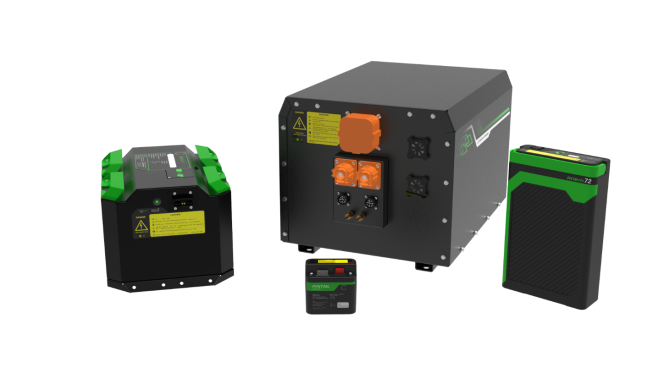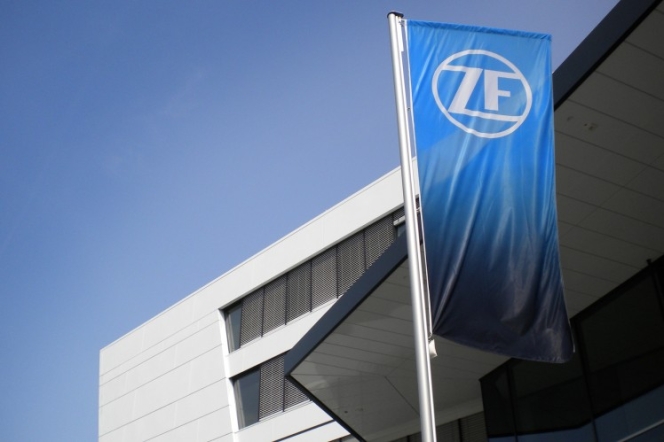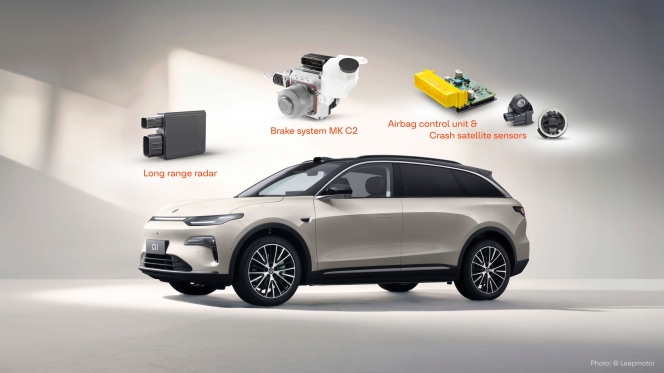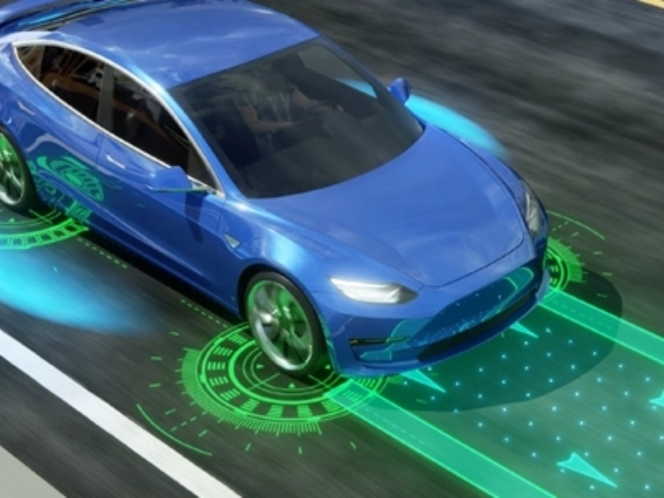Grinntech Evolves To Become A Battery Maker To Reckon With
- By T Murrali
- October 13, 2020

Intending to support India in faster adoption of electric vehicles (EVs) by leveraging entrepreneurial energy of start-up backed by industry leaders, Lithium-ion EV battery maker Grinntech has transformed into a commercial enterprise.
As part of this evolution, the company has attracted industry leaders such as Dr V Sumantran (former Vice- Chairman of Ashok Leyland) and Lakshmi Narayanan (co-founder and former Vice-Chairman of Cognizant) as investors and to serve on the company’s Board of Directors. Besides, K S Manian of Radiance Group and Ucal invested in this company. The company has received about USD2 million from these investors.
Along with a new logo, Grinntech has also unveiled a range of high-tech batteries with unique designs customised to Indian conditions and its proprietary, IoT-enabled BMS to power 2-wheelers, 3-wheelers and tractors/light vehicles.
Grinntech’s journey catalysed with the fundamental truth that the Indian automotive industry’s future is EVs, and India should be self-reliant in EV technologies.

In 2013, Nikhilesh Mishra and Puneet Jain - the two young engineers came together with a passion for making EV industry indigenous. Began with developing the battery swapping model for Tata Ace where interchanging of batteries performed in less than two minutes without any automation, the duo sharpened their focus on 12kW EV conversion kit for the same vehicle. Over 20,000km of field trials conducted to validate the system.
The break-through came with being absorbed at the incubation centre in IIT Madras Research Park in 2017, where they mentored by a leading scientist - Professor Ashok Jhunjhunwala. This period saw the development of lithium-ion batteries for two/three-wheelrs and electric buses. It also gave the company to licence the technology to a few battery manufacturers, including Exide, Amara Raja, Exicom and Cygni. During the last three years, the company generated close to USD1 million, which was ploughed back in research and development. Today, over 80 percent of the staff in the company is involved in its research and development.
After evolving from a pure R & D firm to a manufacturing company, Grinntech is now pushing itself to the operational phase with a modular production system, paying particular attention to cell-characterisation and pack testing. In addition to its new R&D and manufacturing facility in Chennai, the company is exploring a couple of options for a larger manufacturing location to scale up its production capacity.
The new facility will manufacture Robin-72 and Shikhra smart and personalised 2- and 3-wheeler battery solutions using state-of-the-art automated processes and assembly lines. The facility will also manufacture Pintail, an IoT-enabled 2-wheeler starter battery and the Falcon, a larger battery suited to tractors and light vehicles. The modular production layout will allow for easy scaling up as demand grows.
Robin 72 not only provides energy to the vehicle but also makes it smart and personalised. Designed with its patented technology (developed with Qualcomm), it is 7.5 times more capable than an average BMS - battery management system. It makes it most suited for varied EV applications like ride-sharing, delivery services, battery swapping, and personal use vehicles. The battery will last up to five years and it gets up to 80 percent of charge in 40 minutes.
Shikra reduces downtime significantly, thus ensuring better earning opportunities for drivers. Designed with quality materials, it offers segment-best durability, reliability, and longevity. It assures more than 99 percent availability of battery energy. The battery will last for four years and it can get 80 percent of charge in about two hours.
Falcon (96V) is oriented to light-vehicles, including cars, LCVs and light tractors/industrial equipment, and optimised for long-life operation.
Designed, according to JIS standard, Pintail is suitable for IoT enabled petrol 2-wheelers with continuous current draw. The battery offers reliability and life to balance between high current for cranking and long life for the constant current consumption. CAN communication adds smartness and fast charging makes it most suitable for ride-sharing vehicles. The battery can get 80 percent of charge in an hour; it has a life of up to three years.
For all the batteries, the company offers variants with customisable features according to the requirements.
Grinntech works closely with leading global technology companies and cell suppliers, bringing cutting-edge advances in semiconductors, materials, cell-chemistry and formats.”It was always our dream to create a technologically advanced lithium-ion battery product-line built-to-cost for Indian conditions and its production system. We are hopeful that we will catch the fast-growing wave for EV products by Indian customers,” the company founders said.

Mishra said, “When a technology stalwart like Lakshmi Narayanan and a visionary of mobility like Dr Sumantran join hands, I expect nothing less than building up Grinntech’s battery development and manufacturing capabilities to a position of industry leadership. Apart from affordable, high-quality batteries that employ customisable and superior thermal management, we anticipate EV makers and customers will soon require additional capabilities like battery performance analytics and connectivity. With our innovative product range and sophisticated IoT-enabled BMS systems, we are ready for this future.”
Dr Sumantran said, “I am delighted to be a part of Grinntech’s journey when EVs are rapidly gaining acceptance globally and in India, and particularly so at a time when our country has articulated a priority for self-reliance in critical EV technologies. Market conditions will reward those EV battery makers that possess technological and operational competence in the coming years. Grinntech’s combination of performance, quality and economics will play an important part in that journey.”
Narayanan said, “The future of energy is in renewables with significant potential for high growth. Digital technologies such as IoT and data analytics play a crucial role in enabling companies with newer business models to provide much-needed connectedness, high performance and superior customer experience. It is heartening to see start-ups in India boldly embrace technology-driven solutions that can meaningfully address not just India’s challenges but also global ones.”
Off late, Grinntech has been getting inquiries for the supply of batteries to global clients. The anticipated growth of products like E-powered micro-cars, e-bikes, and a range of electrified mobility vehicles in the post-COVID world offers encouraging prospects for companies like Grinntech that possess proprietary technology, a low-cost base, and high-quality products. MT
ZF, BMW Sign Long-Term Supply Agreement For Drive Technologies
- By MT Bureau
- February 03, 2026

German tier 1 supplier ZF Friedrichshafen and the BMW Group have entered into a long-term supply agreement for passenger car drive systems. The contract, valued at several billion euros, extends until the late 2030s.
The agreement focuses on the supply and continued development of the 8-speed automatic transmission (8HP). The partners aim to support low-emission mobility and maintain technological flexibility during the industry transition.
A central component of the partnership is the technical evolution of the 8HP transmission kit to meet the requirements of electrified drives. The development will focus on increasing efficiency and performance for future vehicle concepts.
Mathias Miedreich, CEO of ZF, said, “Together with BMW, we are sending a strong signal for innovation, efficiency, and sustainability in an industry undergoing dynamic change. This agreement highlights the strategic importance of our 8-speed automatic transmission as a key technology for the transformation of drive systems.”
The duration of the contract provides both ZF and BMW with planning stability in a changing market. ZF aims to strengthen its position as a system supplier while reducing risks through close collaboration with the carmaker.
Sebastian Schmitt, Head of ZF's Electrified Drive Technologies division, explained, “The new agreement with BMW shows how important long-term planning horizons are for technological advancements. It creates clarity and stability for both companies and enables us to align the next generation of the 8HP specifically toward efficiency, performance, and long-term viability.”
Leapmotor Selects Aumovio For Safety Technologies
- By MT Bureau
- February 02, 2026

Aumovio has entered a supply agreement with Chinese electric vehicle manufacturer Leapmotor to provide safety components for the carmaker’s B and C platforms.
Several models within Leapmotor’s B platform now utilise Aumovio's long-range radar, electric parking brake and airbag control unit (ACU). Models on the C platform, including the C10, C11 and C16 SUVs, feature the latest generation of the MK C2 one-box brake system, alongside the long-range radar and ACU.
The project was completed with a development cycle approximately one-third shorter than traditional automotive timelines. Aumovio attributed its speed to ‘local-for-local’ strategy in China, where the company operates 20 sites and employs around 10,000 staff. In 2024, Aumovio held a 14 percent share of market revenue in the region.
The supplied technologies include:
- MK C2 Brake System: A unit combining the master cylinder, electronic brake system, and brake booster. It is produced locally in Shanghai.
- Long-Range Radar: A sensor with a detection range of up to 280 metres, used for driver assistance across both platforms.
- Airbag Control Unit (ACU): Integrated with crash satellite sensors, these components are manufactured in Changchun.
Boris Mergell, Head of the Safety and Motion business area at Aumovio, said, “Pairing ‘China speed’ with ‘German quality’ technologies helped us to support a rapid roll-out with our latest safety technologies. This underscores Aumovio’s course towards an adaptive powerhouse that works flexibly and closely with customers to innovate. It also shows that we continue to strengthen our customer relationships in the important market China.”
The partnership supports Leapmotor’s international presence. The B10 and B05 models, which feature Aumovio's ACU and radar technology, were showcased at the IAA 2025 in Munich as part of the manufacturer's European entry.
LTTS Secures Multi-Year Deal From Automotive OEM For Engineering And R&D
- By MT Bureau
- January 28, 2026

Bengaluru-headquartered ER&D company L&T Technology Services (LTTS) has announced a multi-year engagement within its mobility segment from an automotive manufacturer. The agreement involves software, connectivity and digital engineering services across vehicle technology domains. This win follows the company’s investments in R&D labs and mobility infrastructure designed for programs with global manufacturers.
The engagement covers mobility engineering capabilities, including embedded systems, digital platforms, verification and validation, cloud integration and cybersecurity. LTTS intends to use its engineering expertise and delivery frameworks to support the customer's technology roadmap.
At present, LTTS operates 22 design centres and 100 innovation labs globally.
The agreement strengthens the partnership between LTTS and the automotive manufacturer in the area of mobility engineering. The company provides design, development, and testing services across the mobility, sustainability, and tech segments.
Alind Saxena, Executive Director and President, Mobility and Tech at L&T Technology Services, said, “We are proud to deepen our partnership with the valued customer through this strategic engagement. LTTS brings together domain-led engineering, secure development practices and excellence in global delivery to accelerate the future of premium mobility. The win reflects the trust placed in our teams and our commitment to delivering world-class engineering at scale”.
Valeo And NATIX Network Partner To Develop Open-Source World Foundation Model
- By MT Bureau
- January 25, 2026

French technology company Valeo and NATIX Network have announced a partnership to develop a multi-camera World Foundation Model (WFM). The project combines Valeo’s research in artificial intelligence and generative modelling with NATIX’s decentralised physical infrastructure network (DePIN) to create an open-source platform for autonomous driving and robotics.
The initiative aims to move beyond perception-based models by creating a system capable of predicting future states and reasoning about physical interactions in a four-dimensional environment. The model will be trained using NATIX’s data network, which has collected 600,000 hours of video data across the US, Europe and Asia over seven months. This data provides the multi-camera inputs necessary for the spatial perception required by autonomous vehicles and robots.
The partnership builds upon Valeo’s existing open-source frameworks, VaViM (Video Autoregressive Model) and VaVAM (Video-Action Model). While these frameworks were previously trained primarily on front-camera datasets, the integration of NATIX’s multi-camera network expands the AI’s field of vision to 360 degrees.
Under the open-source framework, the partners will release models, datasets and training tools. This approach is intended to allow the research community to fine-tune models and benchmark physical AI across various driving conditions and geographic regions. The collaboration seeks to accelerate the deployment of end-to-end AI models by learning from real-world edge cases captured by vehicles in operation.
Marc Vrecko, Chief Executive Officer, Valeo’s Brain Division, said, “Since our creation in 2018, Valeo’s AI research center has been at the forefront of AI research in the automotive industry, especially in the fields of assisted and autonomous driving. Our goal has always been to advance mobility intelligence safely and responsibly. By combining Valeo’s generative world modeling research expertise with NATIX’s global multi-camera data, we are accelerating both the quality and the accessibility of next-generation end-to-end AI models, enabling the research community to build upon strong open models.”
Alireza Ghods, CEO and Co-Founder, NATIX, added, “WFMs are a once-in-a-generation opportunity — similar to the rise of LLMs in 2017–2020. The teams that build the first scalable world models will define the foundation of the next AI wave: Physical AIs. With our distributed multi-camera network, NATIX has a clear advantage of being able to move faster than large OEMs.”







Comments (0)
ADD COMMENT